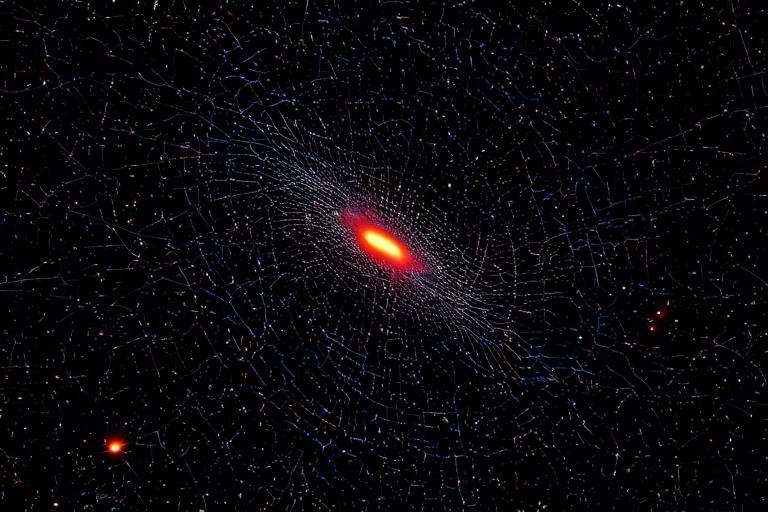Ethics in Space Exploration - A Philosophical Approach
As we stand on the brink of a new era in space exploration, the question of ethics looms larger than ever. Humanity is not just pushing boundaries; we're embarking on a journey that could redefine our existence. But with great power comes great responsibility, right? As we venture into the cosmos, we must ponder our ethical obligations not only to our own species but also to the vast universe that surrounds us. Are we prepared to face the moral dilemmas that await us among the stars?
In this article, we will explore the philosophical implications of our actions in space, considering what it means to be ethical in a realm where the rules are still being written. The cosmos is not merely a playground for exploration; it's a complex tapestry of potential life, environmental concerns, and international responsibilities. As we launch our rockets and send our probes into the unknown, we must ask ourselves: what principles should guide our actions? What legacy do we wish to leave behind?
Space exploration is not just about scientific discovery; it’s about understanding our place in the universe and our responsibilities towards it. The ethical considerations are vast and varied, encompassing everything from the treatment of potential extraterrestrial life to the environmental impacts of our missions. If we are to be stewards of the universe, we must navigate these waters with care, ensuring that our actions today do not lead to regret tomorrow.
As we delve deeper into this topic, we will examine the historical context of space ethics, the principles that should guide our explorations, and the legal frameworks that govern our actions. We will also explore the ethical treatment of extraterrestrial life and the environmental considerations that come with space travel. Each of these facets presents unique challenges and opportunities for ethical reflection. So, buckle up as we embark on this philosophical journey through the stars!
- What are the main ethical concerns in space exploration?
Ethical concerns include the treatment of extraterrestrial life, environmental impacts, and the responsibilities of nations in space. - How does international law influence space ethics?
International treaties, like the Outer Space Treaty, establish guidelines for ethical conduct and cooperation among countries in space. - What is the significance of the Outer Space Treaty?
The Outer Space Treaty serves as a foundational legal framework, promoting peaceful exploration and preventing the militarization of space. - Why is environmental responsibility important in space missions?
Minimizing environmental harm is crucial to ensure sustainable practices and protect both celestial bodies and our own planet.

Historical Context of Space Ethics
Understanding the evolution of ethical considerations in space exploration is crucial for framing current debates surrounding our responsibilities as we venture into the cosmos. The journey of humanity into space is not just a tale of technological advancements but also a narrative steeped in ethical dilemmas and philosophical inquiries. From the early days of space travel to the present, the principles governing our actions in space have evolved significantly, shaped by historical milestones and the lessons learned from past missions.
In the 20th century, the launch of Sputnik in 1957 marked the dawn of the space age, igniting a fierce competition between nations. This race to the stars was not merely about scientific discovery; it was about national pride and power. As nations scrambled to assert their dominance, the lack of ethical frameworks became glaringly apparent. The question arose: what responsibilities do we hold as we explore the unknown? This era prompted initial discussions about the ethical implications of space exploration, laying the groundwork for future treaties and agreements.
The 1960s brought forth a pivotal moment with the establishment of the Outer Space Treaty in 1967, which remains a cornerstone of space law. This treaty introduced the idea that space should be the province of all humankind, emphasizing the need for cooperation and peaceful exploration. The implications of this treaty extended beyond legalities; it challenged nations to consider their ethical obligations not just to one another but to the universe itself. As we began to explore celestial bodies, the ethical considerations surrounding our actions became increasingly complex.
Moreover, the Apollo missions of the late 1960s and early 1970s raised further ethical questions. The moon landing was celebrated as a monumental achievement, yet it also prompted reflections on our impact on the lunar environment. Did we have the right to leave footprints on another celestial body? Were we respecting the natural state of the moon, or were we merely claiming it as our own? These questions are essential as they highlight the need for an ethical framework that guides our exploration beyond Earth.
As we look back, it becomes clear that the historical context of space ethics is not just a series of events but a continuous dialogue. Each mission, each discovery, and each treaty has contributed to our understanding of what it means to be responsible stewards of the cosmos. The evolution of space ethics is a reflection of our growing awareness of the interconnectedness of all life and the importance of preserving the integrity of the universe for future generations.
To summarize, the historical context of space ethics is marked by significant milestones that have shaped our understanding of our responsibilities in space. As we continue to explore, it is imperative to learn from the past and develop ethical frameworks that guide our actions, ensuring that we respect both our planet and the cosmos at large.

Principles of Space Exploration Ethics
As we gaze up at the stars, dreaming of what lies beyond our blue planet, it's crucial to ground our aspirations in solid ethical principles. Space exploration isn't just about technological advancements or the thrill of discovery; it’s about understanding our responsibilities as stewards of the universe. The principles of space exploration ethics serve as a guiding light, illuminating the path we should take as we embark on this cosmic journey. These principles include justice, stewardship, and respect for extraterrestrial life, each playing a vital role in shaping our actions and decisions in the vast unknown.
The principle of justice in space exploration emphasizes fairness and equity among nations and peoples. As we venture into space, we must ensure that the benefits of our discoveries are shared globally, not just hoarded by a select few. This raises questions about the distribution of resources obtained from celestial bodies and the potential for exploitation. Imagine a scenario where one nation claims a rich asteroid, reaping all its rewards while others are left with nothing. This situation could lead to conflict and inequality, undermining the collaborative spirit that should define our endeavors in space.
Stewardship is another cornerstone of space ethics. Just as we have a duty to protect our home planet, we must extend that responsibility to the celestial bodies we explore. This principle calls for a mindful approach to resource extraction and environmental conservation. For instance, when landing on Mars or mining asteroids, we need to ask ourselves: Are we preserving the integrity of these environments? Are we ensuring that our actions do not lead to irreversible damage? By adopting stewardship, we commit to acting as caretakers rather than conquerors.
Furthermore, the principle of respect for extraterrestrial life introduces a profound ethical dimension to our exploration efforts. As we search for signs of life beyond Earth, we must consider the moral implications of our interactions with potential extraterrestrial ecosystems. If we were to discover microbial life on Mars, for example, should we prioritize scientific study over the preservation of that life? This principle urges us to tread carefully, recognizing that our quest for knowledge should not come at the expense of other forms of existence.
To encapsulate these principles, it’s essential to foster a culture of ethical decision-making in space exploration. This means involving a diverse range of voices in the conversation, including ethicists, scientists, policymakers, and the public. By creating an inclusive dialogue, we can better navigate the complex ethical landscape of space exploration and ensure that our endeavors align with the values we hold dear.
Ultimately, as we stand on the brink of a new era in space exploration, we must remember that our actions today will shape the legacy we leave for future generations. By grounding our explorations in the principles of justice, stewardship, and respect for extraterrestrial life, we can embark on a journey that not only expands our horizons but also enriches our understanding of our place in the universe.
- What are the main ethical considerations in space exploration? The main considerations include justice, stewardship, and respect for extraterrestrial life.
- Why is justice important in space exploration? Justice ensures that the benefits of space exploration are shared equitably among all nations and peoples.
- How does stewardship apply to space exploration? Stewardship involves protecting celestial environments and ensuring that our actions do not cause irreversible harm.
- What are the ethical implications of discovering extraterrestrial life? We must consider how to interact with and potentially protect these life forms rather than exploit them.

The Role of International Law
International law plays a pivotal role in shaping the ethical landscape of space exploration. As humanity ventures beyond our planet, the need for a structured legal framework becomes increasingly apparent. This framework not only governs the actions of nations in space but also establishes a foundation for ethical conduct. Think of international law as the traffic lights and stop signs of the cosmos; without them, chaos could reign in the vastness of space.
One of the most significant contributions of international law to space exploration is the establishment of treaties that outline the responsibilities and rights of spacefaring nations. These treaties serve as a guideline, ensuring that countries act in a manner that is not only lawful but also ethical. For instance, the Outer Space Treaty of 1967 is a cornerstone of international space law, setting forth principles that emphasize the peaceful use of outer space and the need for cooperation among nations. It’s like a universal agreement that says, “Hey, we’re all in this together, so let’s play nice!”
Moreover, international law encourages nations to engage in collaborative efforts, fostering an environment of cooperation rather than competition. This is particularly crucial as we face challenges such as space debris and the potential discovery of extraterrestrial life. By adhering to international agreements, countries can work collectively to address these issues, ensuring that ethical considerations are at the forefront of their actions. For example, the Inter-Agency Space Debris Coordination Committee (IADC) promotes international cooperation in the mitigation of space debris, emphasizing the importance of maintaining a sustainable space environment.
However, the effectiveness of international law is often challenged by the rapid pace of technological advancements in space exploration. As new technologies emerge, they can outstrip existing legal frameworks, leading to ethical dilemmas that require urgent attention. This situation calls for a proactive approach, where nations not only comply with current laws but also engage in discussions to update and refine these legal frameworks. It’s akin to upgrading your computer software; if you don’t keep up, you risk falling behind and encountering significant issues.
In summary, international law serves as a crucial mechanism for promoting ethical behavior in space exploration. It lays down the rules of engagement, encourages collaboration, and helps navigate the complex ethical landscape that arises as we push the boundaries of human exploration. As we look to the future, it is essential that we continue to adapt and strengthen these legal frameworks, ensuring that our journey into the cosmos is guided by principles of justice, stewardship, and respect for all forms of life.

The Outer Space Treaty
The Outer Space Treaty, signed in 1967, is a pivotal document in the realm of space law and ethics. It establishes a framework for international space exploration and lays down fundamental principles that govern the activities of nations in outer space. At its core, the treaty emphasizes that space shall be used for the benefit of all humankind, fostering a sense of collective responsibility among spacefaring nations. But what does this really mean for us as we look to the stars?
One of the treaty's key tenets is the prohibition of nuclear weapons and other weapons of mass destruction in space. This is not just a legal stipulation; it reflects a profound ethical stance: the cosmos should not become a battlefield. Instead, it should be a domain for peaceful exploration and scientific inquiry. The treaty also asserts that celestial bodies are the province of all mankind, meaning no nation can claim sovereignty over them. This principle of non-appropriation is crucial as it prevents any single country from monopolizing resources or territory in space, promoting a cooperative rather than competitive approach to exploration.
Additionally, the Outer Space Treaty mandates that nations are responsible for their space activities, including those conducted by private entities. This responsibility extends to ensuring that space exploration does not cause harmful contamination of celestial bodies, which raises ethical questions about our interactions with potential extraterrestrial ecosystems. In essence, the treaty serves as a moral compass, guiding nations toward responsible stewardship of the universe.
However, the Outer Space Treaty is not without its limitations. As technology advances and private companies begin to play a more significant role in space exploration, questions arise about how the treaty can adapt to these changes. For instance, the rise of commercial space travel and asteroid mining presents new ethical dilemmas that the treaty does not fully address. The challenge lies in updating and expanding international law to ensure that it remains relevant and effective in governing these emerging activities.
In conclusion, the Outer Space Treaty is more than just a legal document; it embodies the ethical aspirations of humanity as we venture into the cosmos. It challenges us to think deeply about our responsibilities and the implications of our actions in space. As we stand on the brink of a new era of exploration, we must consider how we can honor the principles of this treaty while addressing the ethical complexities that lie ahead.

Future Legal Frameworks
As we stand on the brink of a new era in space exploration, the need for comprehensive legal frameworks becomes increasingly urgent. The rapid advancements in technology and the growing interest in space tourism, asteroid mining, and potential colonization of other planets necessitate a reevaluation of existing laws. Current treaties, such as the Outer Space Treaty of 1967, laid the groundwork for international cooperation and the peaceful use of outer space. However, they were established during a time when our understanding of space was limited and the possibilities seemed far-fetched. Now, with private companies like SpaceX and Blue Origin leading the charge, we must ask ourselves: Are our laws keeping pace with our ambitions?
Future legal frameworks should address a multitude of issues, including the commercialization of space, the ethical treatment of extraterrestrial environments, and the rights of nations and private entities. For instance, as companies begin to mine asteroids, we need clear regulations to prevent resource conflicts and ensure that exploitation does not lead to irreversible damage to celestial bodies. Moreover, we must consider the implications of human settlement on other planets. What rights do we have over these new worlds? Should they be treated as common heritage, much like the oceans of Earth?
One potential avenue for developing these frameworks is through international collaboration. Just as the Antarctic Treaty established guidelines for the preservation of Antarctica, a similar approach could be taken for space. This would involve creating a new treaty or updating existing ones to include provisions for:
- Resource Management: Guidelines on how to responsibly extract and utilize resources from asteroids and other celestial bodies.
- Environmental Protection: Regulations aimed at preserving the integrity of extraterrestrial ecosystems.
- Human Rights: Considerations regarding the rights of individuals and potential indigenous life forms on other planets.
- Dispute Resolution: Mechanisms for resolving conflicts between nations and companies in space.
Additionally, the role of non-governmental organizations (NGOs) and the private sector cannot be overlooked. As more players enter the space arena, their influence on policy-making will grow. Therefore, it is crucial to include these stakeholders in discussions about future legal frameworks to ensure that all voices are heard and that regulations reflect a diverse set of interests.
Ultimately, the future of space law will depend on our ability to adapt and innovate. We must embrace a proactive approach that anticipates challenges and fosters cooperation among nations, private entities, and the scientific community. By doing so, we can create a legal landscape that not only promotes exploration but also upholds our ethical responsibilities as stewards of the cosmos.
- What is the Outer Space Treaty?
The Outer Space Treaty, established in 1967, is a fundamental framework that governs the activities of countries in outer space, emphasizing peaceful exploration and the prohibition of nuclear weapons in space.
- Why do we need new space laws?
With advancements in technology and increased commercial interest in space, existing laws are often inadequate to address issues like resource exploitation, environmental protection, and human rights.
- How can international collaboration help in space law?
International collaboration can lead to comprehensive treaties that reflect a global consensus on space exploration, ensuring sustainable practices and conflict resolution.
- What role do private companies play in space exploration?
Private companies are becoming significant players in space exploration, driving innovation and investment, but they also raise new ethical and legal challenges.

Ethical Treatment of Extraterrestrial Life
As we gaze into the vast cosmos, the tantalizing possibility of encountering extraterrestrial life becomes more than just a figment of science fiction. It poses profound ethical questions that humanity must grapple with. What responsibilities do we have towards beings that may exist beyond our planet? How do we ensure that our actions do not lead to the exploitation or destruction of alien ecosystems? These inquiries are not just theoretical; they are essential as we prepare for a future where contact with extraterrestrial life could become a reality.
When we think about the , we must first consider the principle of respect. Respecting alien life forms means acknowledging their potential right to exist and thrive in their own environments. Just as we advocate for the conservation of endangered species on Earth, we should extend this ethos to any discovered life forms in space. This respect should also encompass a commitment to understanding these beings, rather than hastily categorizing them as resources to be exploited.
Moreover, the potential discovery of extraterrestrial life brings forth a host of moral dilemmas. Imagine we land on a planet teeming with microbial life, or perhaps even more complex organisms. Would it be ethical to conduct experiments on these life forms? What if our presence inadvertently disrupts their natural habitat? These questions highlight the need for a robust ethical framework that prioritizes the well-being of extraterrestrial ecosystems.
In addressing these ethical concerns, we can draw parallels with our treatment of indigenous cultures on Earth. Historically, encounters between advanced civilizations and indigenous peoples have often resulted in exploitation and cultural erasure. To avoid repeating these mistakes, we must approach extraterrestrial life with a mindset of stewardship rather than domination. This means establishing protocols that prioritize the preservation of alien environments and the rights of their inhabitants, should they exist.
Furthermore, the ethical treatment of extraterrestrial life may also require the formulation of international guidelines. As we venture further into space, a collaborative approach among nations is essential. This could involve creating a United Nations-like body dedicated to overseeing and regulating our interactions with extraterrestrial life. Such a body could help ensure that ethical standards are upheld across the globe, preventing any single nation from acting unilaterally and possibly harming alien ecosystems.
To summarize, the ethical treatment of extraterrestrial life is a complex issue that necessitates deep reflection and proactive measures. As we stand on the brink of a new era in space exploration, it is our duty to ensure that we approach the unknown with a spirit of respect and responsibility. By doing so, we not only safeguard the potential for life beyond our planet but also uphold our own moral integrity as a species.
- What ethical principles should guide our interactions with extraterrestrial life?
Key principles include respect for life, stewardship of ecosystems, and the need for international cooperation to ensure ethical standards are maintained.
- How can we prevent the exploitation of alien ecosystems?
Implementing strict protocols and international regulations can help protect alien life forms and their environments from harmful activities.
- What lessons can we learn from our history with indigenous populations?
We must approach extraterrestrial life with humility and a commitment to understanding, rather than exploiting or dominating, their existence.

Environmental Considerations in Space
As we embark on our thrilling journey into the cosmos, it’s crucial to pause and reflect on the environmental implications of our actions beyond Earth. Space exploration is often viewed as a grand adventure, filled with promises of discovery and advancement. However, just like any expedition, it comes with its own set of responsibilities. The impact of our activities on celestial bodies and our home planet cannot be overlooked. We must consider how our missions affect not only the vastness of space but also the delicate balance of our Earth’s environment.
One of the most pressing concerns is the issue of space debris. As we launch more missions and deploy satellites, we inadvertently create a growing cloud of defunct spacecraft, spent rocket stages, and fragments from collisions. This debris poses a significant threat to both current and future missions. Imagine navigating a busy highway filled with obstacles; space is no different. The potential for collisions increases, raising the stakes for future explorations. Responsible management of space debris is not just an ethical obligation; it’s essential for the sustainability of our endeavors in space.
Moreover, the environmental impact extends to the launch process itself. Rocket launches emit greenhouse gases and other pollutants into the atmosphere, contributing to climate change. The fuels used in these rockets, while powerful, can have devastating effects on our planet’s atmosphere. This raises a critical question: Are we trading one environmental crisis for another? As we strive to explore the stars, we must also prioritize the health of our home planet. Sustainable practices should be at the forefront of our technological advancements.
To illustrate the environmental challenges we face, consider the following table that outlines key aspects of space exploration's environmental impact:
| Aspect | Environmental Impact | Potential Solutions |
|---|---|---|
| Space Debris | Increased collision risk | Active debris removal technologies |
| Rocket Launch Emissions | Greenhouse gas emissions | Development of eco-friendly fuels |
| Planetary Exploration | Contamination of celestial bodies | Strict planetary protection protocols |
As we look to the future, the concept of sustainable space exploration becomes paramount. This means not only minimizing our impact on celestial bodies but also ensuring that we do not jeopardize the health of Earth in the process. It’s about finding a balance between exploration and preservation. We need to ask ourselves: How can we explore the universe responsibly? What measures can we implement to ensure that our quest for knowledge does not come at the cost of our planet’s health?
In conclusion, as we venture deeper into the cosmos, let’s remember that our actions have consequences. The ethical responsibility to protect the environment extends beyond our own planet. By adopting sustainable practices and addressing the challenges of space debris and emissions, we can pave the way for a future where exploration and conservation go hand in hand. After all, the universe is vast, but our home is irreplaceable.
- What is space debris and why is it a concern? Space debris refers to defunct satellites, spent rocket stages, and other fragments that orbit Earth. It poses a collision risk to active satellites and spacecraft.
- How do rocket launches affect the environment? Rocket launches emit greenhouse gases and other pollutants that can contribute to climate change and atmospheric degradation.
- What are some sustainable practices for space exploration? Sustainable practices include developing eco-friendly rocket fuels, implementing active debris removal technologies, and adhering to strict planetary protection protocols.

Space Debris and Its Ethical Implications
As we venture further into the cosmos, the issue of space debris has become an increasingly pressing ethical concern. Imagine a bustling city where trash is left to pile up in the streets; it’s not just unsightly, it’s hazardous. Similarly, our orbit around Earth is becoming cluttered with defunct satellites, spent rocket stages, and fragments from past collisions. This accumulation of debris poses a significant risk not only to current space missions but also to future endeavors. The ethical implications of this growing problem are profound and multifaceted.
First and foremost, we must consider the responsibility of nations and private entities involved in space exploration. Each time a satellite is launched, it’s crucial to think about what happens once it has fulfilled its purpose. Are we ensuring that these objects will not contribute to the growing debris field? The answer is often a resounding no. The ethical principle of stewardship comes into play here, urging us to act as responsible caretakers of the space environment. Just as we wouldn’t leave litter in our parks, we shouldn’t leave debris in orbit.
Moreover, the implications of space debris extend beyond mere aesthetics. Collisions between debris and operational spacecraft can result in catastrophic failures, leading to loss of valuable technology and, potentially, human lives. This raises the ethical question: should we prioritize the safety of our astronauts and equipment over the convenience of launching new missions? The answer should be clear; we must take proactive measures to mitigate risks.
To tackle this issue, several strategies are being discussed within the space community. These include:
- Debris Mitigation Guidelines: Implementing best practices for satellite design, operation, and end-of-life disposal.
- Active Debris Removal: Developing technologies to capture and remove debris from orbit, akin to cleaning up an overflowing dumpster.
- International Collaboration: Encouraging nations to work together in monitoring and managing space debris, recognizing that this is a shared responsibility.
In addition to these strategies, it’s essential to foster a culture of awareness and education regarding space debris. Just as we teach children the importance of recycling on Earth, we must instill a sense of responsibility in future generations of space explorers. By promoting ethical considerations in space missions, we can ensure that our activities do not jeopardize the safety and sustainability of the space environment.
Ultimately, the ethical implications of space debris challenge us to rethink our approach to exploration. As we stand on the brink of a new era in space travel, we must ask ourselves: what kind of legacy do we want to leave behind? Just as we are stewards of our planet, we must also become stewards of the cosmos, ensuring that our pursuit of knowledge does not come at the expense of the very environment we seek to explore.
What is space debris?
Space debris refers to non-functional satellites, spent rocket stages, and fragments from collisions that orbit the Earth.
Why is space debris a concern?
Space debris poses risks to operational satellites and crewed missions, potentially leading to catastrophic collisions.
What can be done to mitigate space debris?
Strategies include debris mitigation guidelines, active debris removal technologies, and international collaboration to manage and monitor space debris.
How does space debris affect future space exploration?
The increasing amount of debris complicates future missions, as it raises the risk of collisions and necessitates more complex navigation strategies.

Future of Human Colonization
The concept of human colonization beyond Earth is not just a sci-fi fantasy anymore; it's a topic that is rapidly gaining traction in scientific and ethical discussions. As we stand on the brink of a new era in space exploration, the question arises: what does it mean for humanity to settle on other planets? The potential for colonization brings with it a plethora of ethical dilemmas that we must navigate carefully. Imagine landing on a distant planet, stepping out of a spacecraft, and realizing that you are not just explorers but also potential settlers. What responsibilities do we carry with us?
First and foremost, we must consider the implications of indigenous life forms. If we were to find microbial life on Mars or any other celestial body, would it be ethical to disrupt their ecosystems? Just as we strive to protect endangered species on Earth, we must extend that same respect to alien life. The moral question here is profound: does our desire to explore justify the potential harm to life forms that have existed for eons in their own ecosystems? We must tread lightly and consider the long-term consequences of our actions.
Additionally, the idea of colonization raises the specter of resource exploitation. As we look to other planets for resources—be it water, minerals, or energy—how do we ensure that we do not replicate the mistakes of our past on Earth? History has shown us the devastating effects of colonialism and exploitation. We must learn from those experiences and create frameworks that prioritize sustainability and respect for the environments we encounter. For instance, if we were to mine asteroids or extract resources from the Moon, we should have a well-defined plan that minimizes environmental impact and ensures that we do not leave behind a trail of destruction.
Furthermore, the logistics of establishing human colonies in space are staggering. A colony on Mars, for example, would require not just the initial landing and setup but also ongoing support systems for food, water, and shelter. This leads to questions about governance and social structures within these colonies. How will we ensure that these new societies are just and equitable? Will they mirror the inequalities we see on Earth, or can we create a new model for living? The potential for conflict over resources and governance is a real concern that we must address before we embark on such ambitious endeavors.
As we look towards the future, it is crucial that we engage in international dialogue about the ethical implications of colonization. Just as the Outer Space Treaty of 1967 established guidelines for the use of outer space, we need to develop new agreements that address the ethical treatment of extraterrestrial environments and life forms. This could include regulations on resource extraction, habitat preservation, and the rights of potential indigenous species.
In conclusion, the future of human colonization in space is filled with both exciting possibilities and daunting ethical challenges. As we prepare to take these monumental steps, we must ensure that we do so with a strong sense of responsibility. The choices we make today will shape not only the future of humanity but also the legacy we leave behind in the cosmos. Will we be remembered as respectful stewards of the universe, or as reckless conquerors? The answer lies in our ability to engage thoughtfully with the ethical dimensions of our explorations.
- What are the main ethical concerns regarding human colonization of other planets? The primary concerns include the treatment of potential indigenous life forms, the impact on local ecosystems, and the governance of new colonies.
- How can we ensure that space colonization is sustainable? By establishing ethical frameworks and regulations that prioritize environmental protection and respect for extraterrestrial life.
- What role do international treaties play in space colonization? Treaties like the Outer Space Treaty help govern space activities and set guidelines for ethical conduct in space exploration.
Frequently Asked Questions (The title must be written in English.)
- What are the ethical considerations in space exploration?
Ethical considerations in space exploration revolve around our responsibilities as we venture into the cosmos. This includes respecting extraterrestrial life, ensuring justice and stewardship in our actions, and minimizing harm to both celestial bodies and our own environment.
- How does international law influence space ethics?
International law plays a crucial role in shaping the ethical framework of space exploration. Treaties like the Outer Space Treaty of 1967 set guidelines for responsible behavior in space, emphasizing cooperation among nations and the peaceful use of outer space.
- What is the Outer Space Treaty and its significance?
The Outer Space Treaty is a cornerstone of space law that outlines the principles for the exploration and use of outer space. It emphasizes that space exploration should be conducted for the benefit of all humanity and prohibits the placement of nuclear weapons in space.
- What ethical issues arise from the discovery of extraterrestrial life?
The discovery of extraterrestrial life raises profound ethical questions about our interactions with these life forms. It challenges us to consider the moral implications of potentially exploiting alien ecosystems and the responsibilities we have toward them.
- How does space debris impact ethical considerations?
Space debris poses significant risks to current and future missions, raising ethical questions about our responsibility to manage and mitigate this issue. Nations must collaborate to ensure that space remains a safe and sustainable environment for exploration.
- What are the ethical implications of colonizing other planets?
The prospect of colonizing other planets brings up ethical dilemmas regarding the treatment of potential indigenous life forms and the moral responsibilities we have towards them. It also raises questions about the sustainability of human settlements in space.
- How can we ensure sustainable practices in space exploration?
To ensure sustainable practices in space exploration, we must prioritize minimizing environmental harm, responsibly managing resources, and developing technologies that reduce our impact on both celestial bodies and Earth's environment.



















